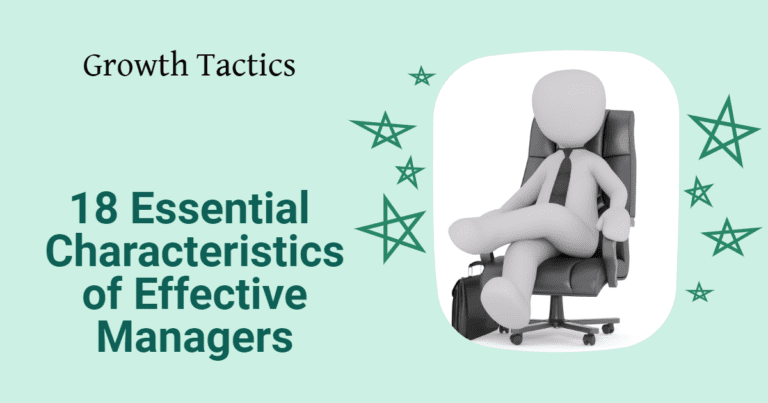Hey there! Are you ready to dive into the world of effective managers? Well, you’re in the right place! In this article, we’ll explore the characteristics of effective managers that make them truly great and discuss why developing these qualities is essential for success. So, grab a cup of coffee, and let’s get started!
Jump To Section
What are the Qualities of a Good Manager?
Let’s kick things off by discussing the qualities that define a good manager. Effective managers possess a range of skills and traits that enable them to lead their teams to success. Whether it’s having strong communication skills, being able to make decisions under pressure, or fostering a positive work environment, these qualities are the building blocks of great management.

Empower Your Team
One of the key traits of a good manager is the ability to empower their team members. Effective managers understand that their role is not just about delegating tasks, but rather creating an environment that allows their employees to thrive. By trusting and empowering their team members, managers enable them to take ownership of their work and contribute to the overall success of the organization.
Make Decisions with Confidence
In addition to empowering their team, great managers know how to make decisions with confidence. Being able to analyze complex situations, gather information, and make informed choices is crucial in a leadership role. A good manager understands the importance of timely decision-making and takes responsibility for the outcomes.
Build Strong Listening Skills
Listening skills are another vital quality that sets great managers apart from the rest. Effective managers understand the power of active listening and prioritize understanding their team members’ perspectives. By actively listening, managers foster open and honest communication, which leads to better collaboration and a more engaged workforce.
Promote Teamwork and Collaboration
A great manager knows that teamwork is the key to achieving goals and driving success. They create an atmosphere of collaboration, encouraging their team members to work together and support one another. By fostering a culture of teamwork, managers empower their employees to excel individually and as a cohesive unit.
What are the Characteristics of an Effective Manager?
Now that we’ve discussed some of the qualities of a good manager, let’s dive deeper into the characteristics that define an effective manager. These characteristics encompass a range of skills, traits, and behaviors that mark exceptional leadership.
Understanding the Common Characteristics
Effective managers understand that there are common characteristics that successful leaders possess. These characteristics include strong communication skills, a clear understanding of the company’s goals and objectives, and the ability to inspire and motivate their team members.
Leading by Example
Leading by example is a crucial characteristic of an effective manager. A great leader sets a good example for their team by embodying the values and behaviors they expect from their employees. When managers set high standards for themselves and demonstrate their commitment to the organization, it inspires their team members to follow suit.
Effective Communication is Key
Communication is the backbone of any successful relationship, and that holds true in the workplace as well. Effective managers understand the importance of good communication and strive to communicate clearly, honestly, and consistently with their team members. They are adept at tailoring their communication to different individuals and situations, ensuring that key messages are understood by all.
Understanding Employee Engagement
Employee engagement is a vital aspect of effective management. Great managers recognize the importance of creating an environment where employees feel valued, heard, and included. They actively seek feedback, provide constructive guidance, and foster a culture of growth and development.
The Skill of Delegation
Delegating tasks is not just about assigning work to others; it’s about leveraging the skills and capabilities of your team members to achieve the best possible results. Effective managers know how to delegate responsibilities, trusting their team members to handle tasks and projects. By empowering their employees through delegation, managers create opportunities for growth and development while ensuring that work is distributed efficiently.
Adaptability
In the ever-changing business landscape, adaptability is key. Effective managers understand the need to evolve with the times and are open to new ideas and approaches. By embracing change, they can navigate challenges and seize opportunities, ultimately driving success for their team and organization.
Problem-Solving Skills
Great managers are skilled problem solvers. They approach challenges with a solution-oriented mindset, focusing on identifying root causes and implementing effective strategies to overcome obstacles. By championing a growth mindset, they inspire their team members to tackle challenges head-on and find innovative solutions.
Resilience
Resilience is a superpower of effective managers. They remain calm under pressure and bounce back from setbacks, demonstrating a spirit of determination and perseverance. By handling difficult situations with grace and optimism, they inspire their team members to do the same, fostering an environment of resilience and unwavering resolve.
Empathy
Effective managers possess a strong sense of empathy. They take the time to understand their team members’ emotions, perspectives, and needs. By demonstrating compassion in their interactions, they create a sense of psychological safety and foster stronger connections with their team. Empathy allows them to lead with understanding and support, helping their employees thrive.
Time Management
Great managers are masters of time management. With countless tasks and projects on their plate, they prioritize effectively, delegate tasks when necessary, and ensure that projects are completed within deadlines. By managing their time efficiently, they set a positive example for their team members, promoting productivity and a healthy work-life balance.
Conflict Resolution Skills
Conflict is bound to happen in any workplace, and effective managers are skilled in managing and resolving conflicts constructively. They mediate disputes, encourage open dialogue, and create a safe space for team members to express their concerns. By promoting healthy conflict resolution, they foster a harmonious work environment and maintain positive team dynamics.
Visionary Thinking
Great managers have a vision for the future. They inspire their team members with their forward-thinking mindset by setting strategic goals, communicating a clear vision, and aligning their team toward achieving organizational objectives. By being visionary leaders, they ignite passion and inspire their team to go above and beyond.
Integrity
Integrity is a non-negotiable characteristic of effective managers. They lead with honesty, transparency, and ethical behavior, gaining the trust and respect of their team members. By embodying integrity, they create a culture of trust and cultivate stronger relationships, ultimately driving higher performance and engagement.
Coach and Mentor
Last but not least, effective managers take on the role of a coach and mentor. They provide guidance, support, and feedback to help their team members thrive and develop their skills. By investing in the growth and success of their employees, they empower them to reach new heights and create a legacy of leadership.
Ways to Cultivate these Characteristics in Yourself
Now that we’ve explored some key characteristics of effective managers, you may be wondering how you can build and enhance these traits in yourself. While some of these qualities may come more naturally to some individuals, there are several approaches you can take to cultivate these skills.
Embrace Growth Mindset and Continuous Learning
One of the best ways to build these characteristics in yourself is to foster a growth mindset and a commitment to continuous learning. Seek out professional development opportunities, such as workshops, seminars, and coaching sessions, that will help you develop your skills as a manager. Stay up-to-date with technology and industry trends relevant to your field, and be open to learning from your team members and colleagues.
Seek Out Mentors and Role Models
Another excellent way to build these traits in yourself is to seek out mentors and role models who embody these characteristics. Identify individuals who you admire and respect and ask them to mentor you. Take the time to learn from them about their experiences, their approaches to leadership, and how they have cultivated the traits you aim to develop in yourself.
Practice active Listening and Effective Communication
Effective communication is the cornerstone of great leadership. One of the best ways to build empathy, conflict resolution, and visionary thinking is by practicing active listening and effective communication. Make an effort to hear out your team members’ concerns, perspectives, and feedback, and communicate your expectations and goals clearly and effectively. By promoting a culture of open dialogue, you will create a foundation of trust and collaboration.
Focus on Goal-Setting and Time Management
Great managers also know how to set clear goals, prioritize their tasks effectively, and manage their time efficiently. By improving your goal-setting and time-management skills, you can build resilience and problem-solving while also inspiring your team members to do the same. Identify the most critical goals for your team and set a path to achieve them, delegate tasks when appropriate, and balance your workload effectively.
Lead with Purpose and Integrity
Finally, one of the most important ways to build these characteristics in yourself is to lead with purpose and integrity. Set a clear vision for your team, communicate your expectations and values clearly, and always act with honesty and ethical behavior. By being a model of integrity, you will inspire your team to follow your lead and foster strong relationships built on trust and respect.
In Conclusion
Remember, effective management is a continuous journey of growth and development. By embodying these characteristics and continuously honing their skills, managers can become exceptional leaders who drive success and inspire their teams. So, go forth and become the effective manager you aspire to be!
Feel free to reach out if you have any further questions or if there’s anything else you’d like to know. Happy managing!


